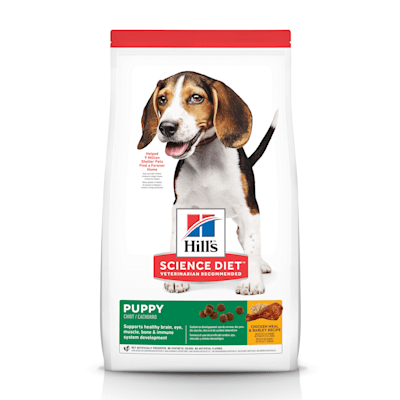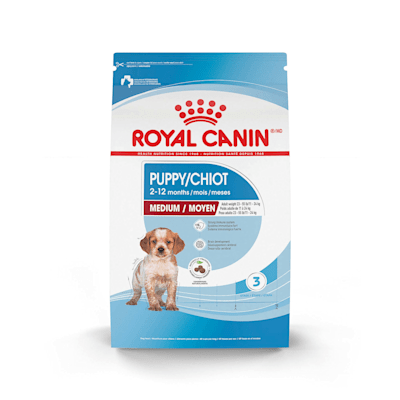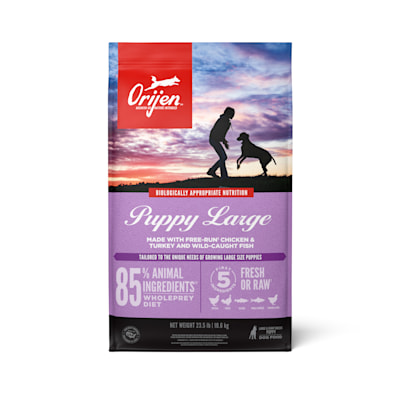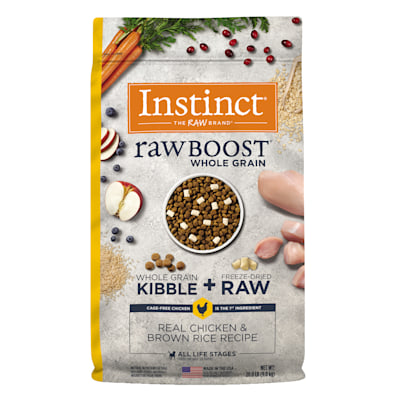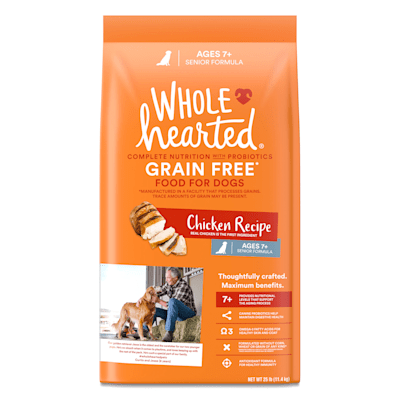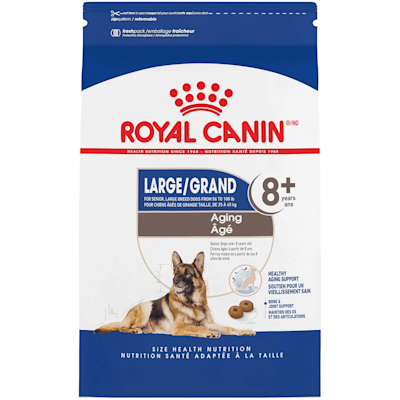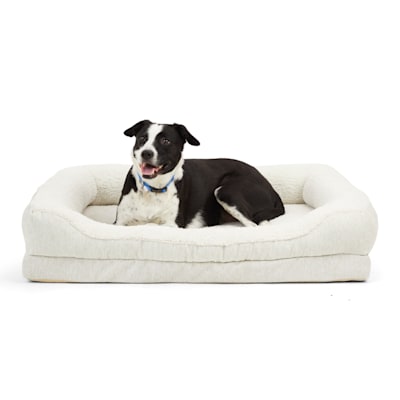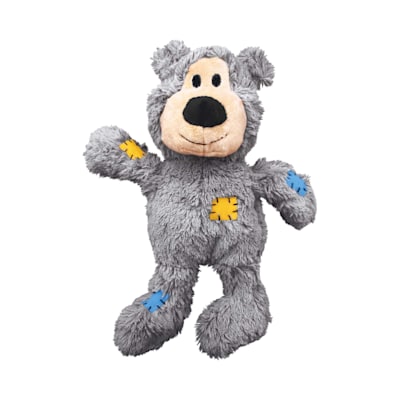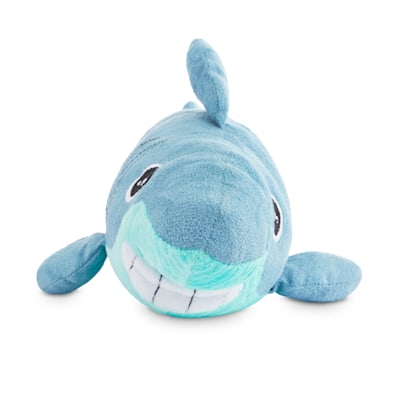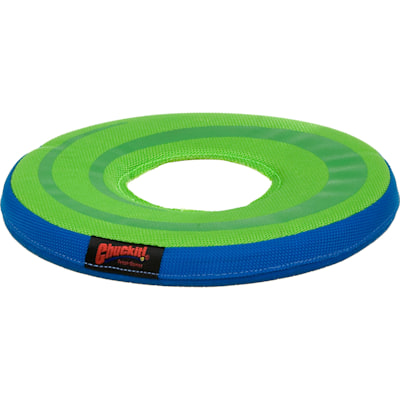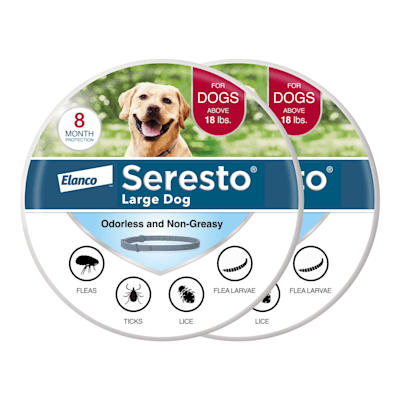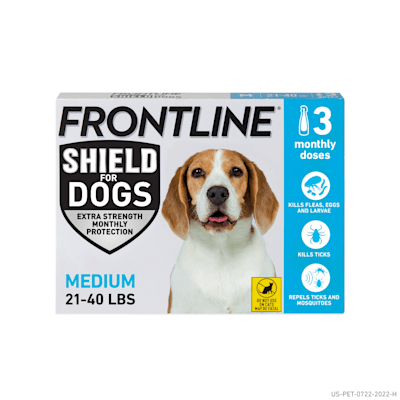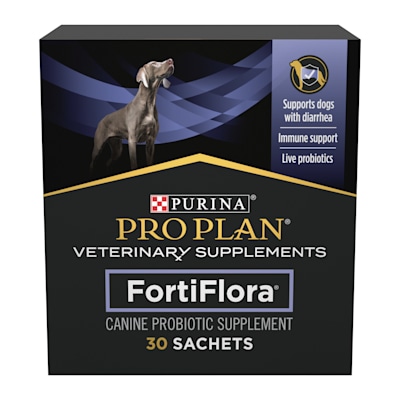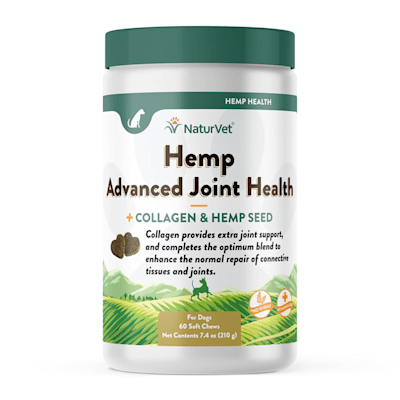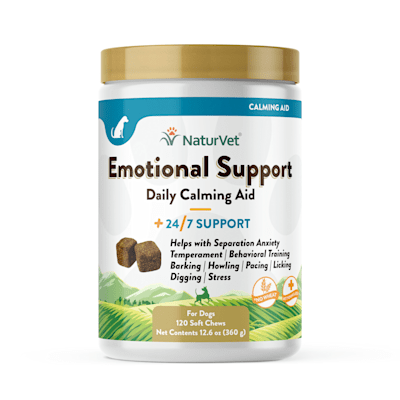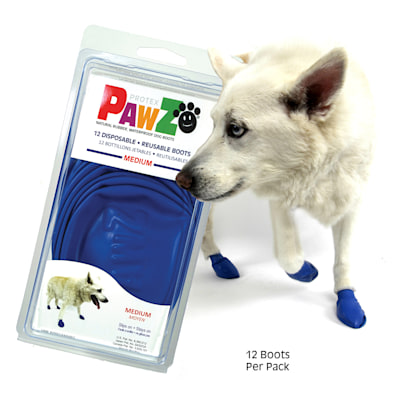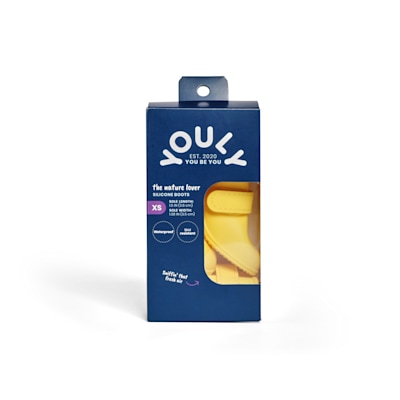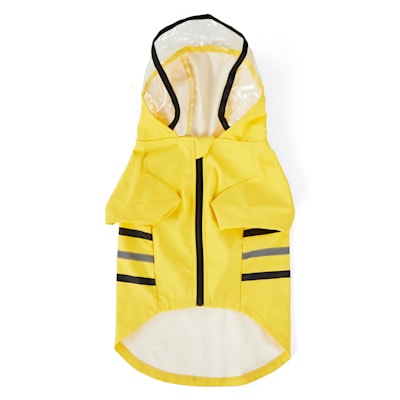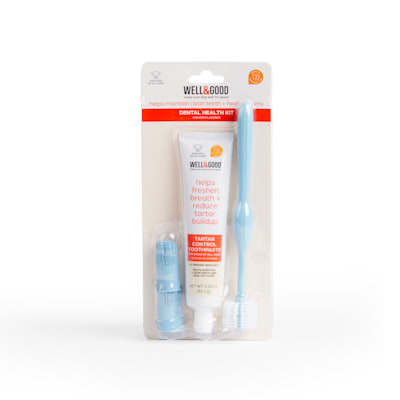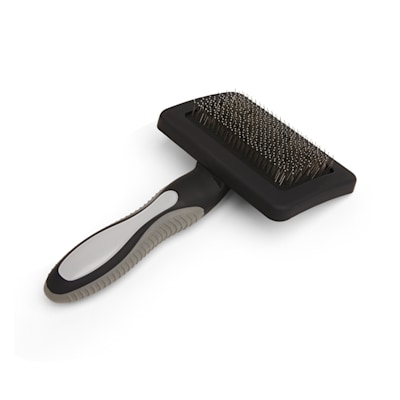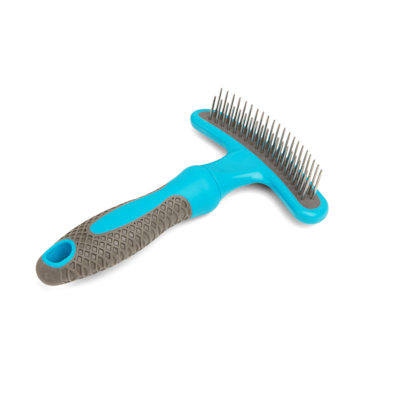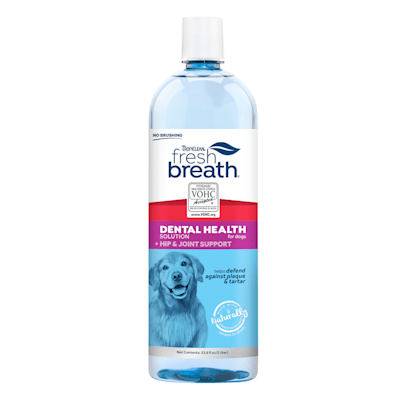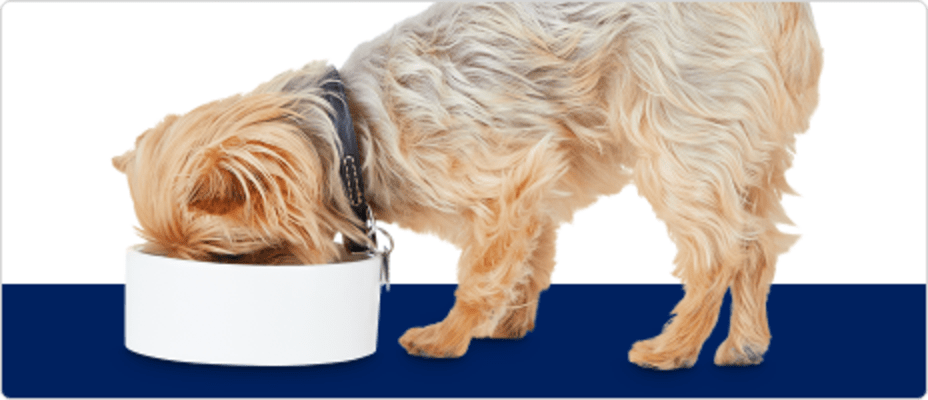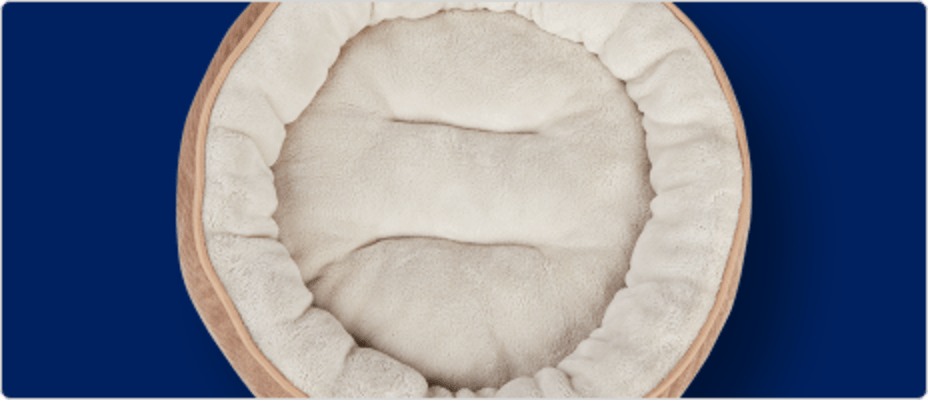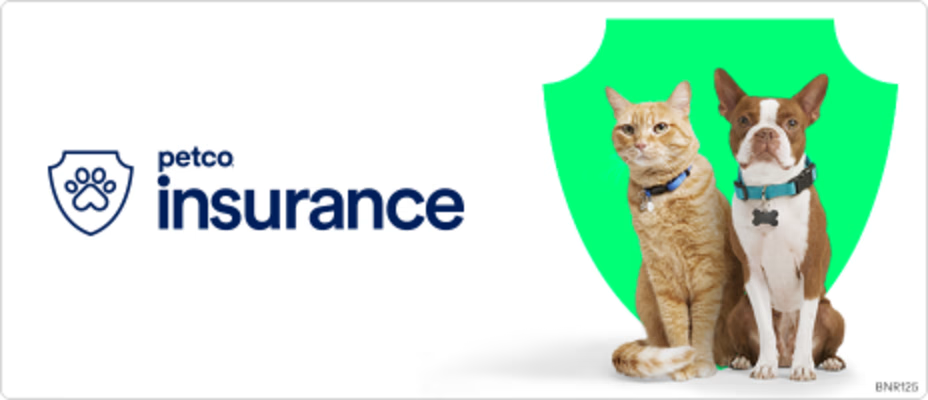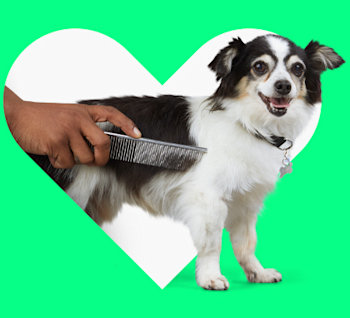
Goldendoodle
What is a Goldendoodle? You won’t find them listed as a registered breed, and their appealing intersection of looks, personality and intelligence may seem too good to be true. A “designer dog” that’s born from Golden Retriever and Poodle parents, the Goldendoodle holds many of these parent breeds’ best traits while offering a bright-eyed playfulness all their own.
Goldendoodle weight, height and coat color can vary widely. While Goldendoodles often share their Golden Retriever parent’s signature golden fur, their coats can also come in colors ranging from white to black to brindle, with textures ranging from curly to fluffy. Though their size and appearance can differ, Goldendoodles are nearly universal in sharing a happy, affectionate personality marked by playfulness, intelligence and athleticism. Learn more about the beautiful, friendly Goldendoodle crossbreed and why so many pet parents love bringing them into their homes.
Characteristics
Goldendoodle weight, height and coat color can vary widely. While Goldendoodles often share their Golden Retriever parent’s signature golden fur, their coats can also come in colors ranging from white to black to brindle, with textures ranging from curly to fluffy. Though their size and appearance can differ, Goldendoodles are nearly universal in sharing a happy, affectionate personality marked by playfulness, intelligence and athleticism. Learn more about the beautiful, friendly Goldendoodle crossbreed and why so many pet parents love bringing them into their homes.
The Goldendoodle temperament is one of their most compelling traits, as the sunny disposition of a Golden Retriever and the intelligence of a Poodle meet in this crossbreed. Goldendoodles are as active and energetic as both parent breeds and tend to exhibit the skillful agility of Poodles. But they also have a style all their own, as Goldendoodle size, coloring and coat texture can vary dramatically from one dog to the next.
Height
Measured from the floor to the top of their shoulders when standing or sitting
Standard/Large: 22-24 inches
Medium: 17-21 inches
Mini: 13-17 inches
WEIGHT
Their average adult weight
Standard/Large: 50-90 lbs
Medium: 30-45 lbs
Mini: 15-35 lbs
LIFE EXPECTANCY
The average number of years they live
10-15 years
COLOR
Common fur colors
Gold, brown, gray, red, black, blue, cream, white, bicolor, merle, brindle
GROUP
Their AKC classification based on heritage, traits, form and function
Hybrid
Size
LIVING SPACE
EXERCISE
PERSONALITY
BARKING
PROTECTION
BEHAVIOR WITH KIDS
TRAINING
SHEDDING
CLIMATE
Diet and nutrition
Like all dogs, Goldendoodles are most likely to thrive on a balanced diet that is nutritionally dense with high-quality protein, fat and easily digestible carbohydrates. Because of their active nature, Goldendoodles—especially large-sized ones—may need additional joint support in the form of food or supplements that contain glucosamine, chondroitin, MSM or fish oil. Always make sure that whatever dog food you give your Goldendoodle is appropriate for their age, size and activity level. Because Goldendoodle weight issues can arise when these dogs don’t get as much activity as they require, be careful not to overfeed or under-exercise your dog.
From nutritious food and dog treats to bones and teething toys, Petco has a range of delicious goodies that you can feel as good about giving to your Goldendoodle as your dog will about tasting them.
Recommended Goldendoodle supplies
The Goldendoodle has the winning personality, temperament and specific needs common among many members of this crossbreed. However, the variances that can occur from one Goldendoodle to another—including size, coat texture and favorite activities—means that the list of Goldendoodle supplies commonly needed by pet parents can also vary. At Petco, we can help you decide which Goldendoodle puppy supplies your special pet needs as you get your home ready for a new dog.
Active dogs like Goldendoodles often benefit from extra joint support. Along with vitamins and supplements, another beneficial form of support can come from specially constructed bedding. An orthopedic dog bed can help relieve stress and pressure from your Goldendoodle’s hips and joints while helping them get a good night’s sleep.
Sometimes the fun things still count as essential Goldendoodle accessories. Toys can help your dog get the recommended amount of daily exercise, relieve boredom and anxiety and facilitate enrichment and mental stimulation. At Petco, we have an assortment of fun toys to help your Goldendoodle accomplish all these goals. Make sure you choose a toy that’s the recommended size for your dog.
Flea & tick solutions are some of the best things for Goldendoodles you can ever buy, as pest prevention is crucial for your dog’s health in both the short and long term. Fleas & ticks are incredibly irritating and uncomfortable for pets—and stressful for their parents—but they can also carry potentially deadly diseases and spread them to your Goldendoodle. Make sure flea & tick control solutions are on your new Goldendoodle puppy checklist and be diligent about using them as directed throughout your dog’s life.
Because a quality diet is foundational to your pet’s wellbeing, food and supplements that support your dog’s body with real nutrition are among the best Goldendoodle products you can buy. Naturally active pups may benefit greatly from supplements formulated with glucosamine and omegas for hip and joint support. A probiotic to ease potential digestive issues is another popular choice. There are even supplemental soft chews made with ingredients known to help calm dogs who experience anxiety—a good option if you have a nervous Goldendoodle.
A Goldendoodle’s signature wavy coat—typically somewhere between the tight curl of a Poodle and the fluff of a Golden Retriever—is good at holding more than just our attention. It can trap moisture easily and keep your dog damp, which can be uncomfortable for your dog and bad news for your furniture. Waterproof Goldendoodle accessories can shield your dog from getting sopping wet on walks in rainy weather. A reflective vest can also help drivers and bikers see your dog better on overcast days.
Grooming your pup is an important task that you can do yourself if you have the right tools. As part of their grooming routine, always check your pup's teeth. Your Goldendoodle’s dental health is just as important as yours, but you can’t use human oral hygiene solutions when caring for your dog’s teeth. Toothbrushes and toothpaste designed for canines should always be on hand in your collection of Goldendoodle stuff. You can even add a dental health liquid to your dog’s water dish for extra support between brushings.
Training your Beagle
Some dog breeds are known to be stubborn and more difficult to train, but not the Golden Retriever or the Poodle—and not their adorable offspring, the Goldendoodle. In fact, Goldendoodles are typically naturally responsive and adaptable. Goldendoodle training can help promote clear communication, and because Goldendoodles are eager learners, they can quickly pick up on training cues. Goldendoodles also have a deep drive to please their favorite people, providing them with motivation to do a good job and win your praise.
Goldendoodle training is essential at a young age. Like any puppy, they’re full of energy—and that mischievous, stubborn Golden Retriever streak may make an appearance. Here are some tips on how to train a Goldendoodle.
- Take them out immediately after eating, drinking or upon waking
- Take them out to the same spot every time
- Don’t scold your pet if they have an accident—clean up and move on
- Provide praise and reward them with dog treats when they go outside or ask to go—and as soon as they go potty
Training sessions are for everyone
When it comes to training your Goldendoodle puppy, remember that you’re teaching your entire household how to be pet parents as well. Most Goldendoodles are intelligent and eager to learn, but if they’re getting mixed messages from different people, they’ll get confused.
Make sure everyone is on the same page and knows the right training cues and hand signals to communicate with your pet. It can be very tempting for visitors and younger family members to indulge your cute puppy and encourage undesired behaviors, but this can hinder the puppy’s progress.
You should always use positive reinforcement during Goldendoodle puppy training. After a long day, it can be easy to get frustrated or shout when they don’t listen or have an accident on the carpet. However, these techniques can negatively impact their mental health and likely decrease the trust they have placed in you. You want to strengthen your bond with your puppy while training, and positive reinforcement is widely recognized as the most effective and ethical way to do this.
Crate training can benefit you and your dog
Goldendoodle crate training can be a great training solution when your puppy is still learning. It helps with potty training—many dogs will instinctively avoid going in their crate—and it gives them a secure area of their own to rest when they’re tired or stressed. It also helps protect them from wandering around and hurting themselves in the middle of the night when you’re sleeping. Providing a secure place for your pup to rest and relax can be the first sign of trust that establishes the cornerstone for later training.
The key is to make their crate a happy place. You should neverforce your puppy into their crate—instead, lure them with treats and let the experience be voluntary. If you turn crate time into a positive, you will find that they’ll start heading to their crate on their own when they’re sleepy or need a break.
Never leave your puppy in their crate for an extended period. Remember, your pup will try to avoid going to the bathroom in their crate—a crucial part of Goldendoodle potty training. You also shouldn’t use the crate as a place for timeouts or punishment, as your dog will start forming negative associations with it.
A good guideline for crate time is taking your dog’s age in months and adding one—this is the maximum number of hours they should be left in the crate at a time. For example, if your dog is six months old, they should only be in the crate for a maximum of seven hours. It may be difficult waking up in the middle of the night to let your puppy go pee, but Goldendoodle puppy training is a lot like raising a toddler—it takes patience and time.
Consistency is the key to Goldendoodle potty training
Puppy potty training is something you want to accomplish sooner rather than later, but every dog is different. Here are some tips when you’re first learning.
When figuring out how to potty train a Goldendoodle puppy, patience and consistency are key factors. It’s also important to remember your pup has a tiny little bladder—taking them outside as frequently as possible will help prevent accidents. Eventually, they’ll get the hang of it.
Suggested training services
At Petco, we realize how difficult it can be to fit training into your busy schedule. We have a variety of training classes that can be attended either in person or online. Whether you need assistance with a puppy or adult dog, our classes focus on the behaviors and cues that are most helpful to you. We even have private lessons in case your pup is having trouble socializing. Having the proper tools in your Goldendoodle training arsenal can help bridge the communication gap with your pet and help you understand each other better.
Common Goldendoodle health problems
Are you thinking of bringing a Goldendoodle home? This hybrid breed has great qualities that make them a wonderful addition to many different types of families. Another positive aspect of this breed is that major health issues with Goldendoodles are not as common as some other breeds. As a hybrid between a Golden Retriever and a Poodle, Goldendoodles can have less risk of breed-related health issues compared to some pure breeds. In fact, the life expectancy of a Goldendoodle is an impressive 10 to 15 years.
This isn’t to say that Goldendoodle health issues are non-existent. Goldendoodles are still at risk of some of the same illnesses and hereditary conditions seen in Golden Retrievers and Poodles. As you begin your adoption journey, it’s important to be aware of Goldendoodles’ common health issues so you can do your research and ask breeders, rescue organizations or shelters the right questions.
Here are the most common Goldendoodle health issues that pet parents are likely to see.
Subvalvular aortic stenosis occurs when the area beneath the heart’s aortic valve becomes narrowed. This hereditary condition common in large breeds can cause complications when blood flows through the heart. In moderate or severe cases, this condition can put extra strain on your Goldendoodle’s heart, potentially leading to more serious long-term heart issues.
Goldendoodles with very mild forms of subvalvular aortic stenosis may have few—if any—symptoms. It’s typically in moderate or severe cases that you might start to notice changes in your dog’s behavior—but even a young puppy might show symptoms if this is something they were born with. Your Goldendoodle may seem weak, have difficulty breathing or even temporarily lose consciousness. In a worst-case scenario, their heart may even work so hard that it suddenly stops beating.
Unfortunately, there is no cure for subvalvular aortic stenosis. If your pet’s condition warrants it, your vet may prescribe beta-blocker medication to help ease the work of the heart. Your vet may also advise you to limit your Goldendoodle’s activity level. In more severe cases, surgical procedures may be recommended to help correct the obstruction on the heart.
There is much that veterinary medicine still doesn’t definitively understand about this scary neurological disorder that can cause seizures in dogs. Epilepsy can be inherited or a result of structural problems in the brain. Unfortunately, many times the cause of epilepsy is unclear. It is important to document the effects of your dog’s seizures to help your veterinarian determine causes and treatments. Taking a video of seizure activity is a good way to help your vet diagnose and treat the disorder.
The most dramatic symptom of this Goldendoodle disease is a seizure, but you may also notice that your dog is confused, has trouble breathing, drools excessively or becomes unresponsive. Contact your vet immediately if you suspect your pup has had a seizure.
If your vet diagnoses Goldendoodle with epilepsy, they will likely prescribe anti-epileptic drugs—or AEDs. AEDs can have strong side effects but are typically not as severe as the effects of epilepsy itself. With testing and frequent follow-ups, your vet will work to find the right drug balance for your pet.
This common genetic condition is more likely to be found in larger breeds of Goldendoodles. However, Goldendoodle hip dysplasia can appear in any size dog of this breed. Hip dysplasia occurs when the ball and socket of the hip do not fit together properly, causing improper wear on the joint. Over time, this mismatch can wear away the joint, causing pain, arthritis, loss of mobility and—commonly in Goldendoodles—back leg problems.
Hip dysplasia is more commonly found in older dogs, but it can also affect young dogs. Symptoms to look out for include stiffness or limping, difficulty standing, reluctance to run or jump and decreased activity.
Prevention is one of the most highly recommended courses of action for Goldendoodle hip dysplasia. Make sure to feed your puppy appropriate puppy food so they grow at a moderate pace. Manage your dog’s weight throughout their life and offer training treats in moderation, as obesity can exacerbate hip dysplasia later in life. Finally, supplements like glucosamine can help support joint health.
This group of degenerative diseases causes the deterioration of the photoreceptor cells in your dog’s retina responsible for recognizing light. Over time, progressive retinal atrophy—or PRA—can lead to blindness.
PRA is a gradual Goldendoodle health issue. The first symptom many pet parents notice is a loss of their pet’s night vision. Going out to use the bathroom after dark may cause them to hesitate because they feel vulnerable, and they may bump into furniture in unfamiliar rooms that aren’t brightly lit. Other symptoms include glassy eyes and dilated pupils.
At this time, there are no known effective treatments for progressive retinal atrophy. The recommended course of action is to work with your vet to manage your pet’s symptoms and find ways to make it easier for your pup to get around without their full sight.
The highest cancer rate is found in the Golden Retriever breed. Because this breed makes up half the genes of a Goldendoodle, they can have a higher risk of cancer. Fortunately, over the past years, new treatment options have dramatically increased the survival rate for many forms of cancer in Goldendoodles.
Many symptoms of cancer in Goldendoodles—and other dogs—are similar to cancer symptoms in humans and can vary depending on the type of cancer. These include lumps, enlarged lymph nodes, poorly healing wounds, bleeding from orifices, lameness or swelling in the bone. Regular brushing and health checks can increase the likelihood of catching cancer symptoms early.
Treatment recommendations will depend on the type of canine cancer. Your vet will likely refer you to a veterinary oncologist who will design a treatment plan for your pup. Common cancer treatments include tumor removal, surgery, chemotherapy, radiation therapy, immunotherapy or a combination of these treatments.
As your dog ages, proteins in the eye can begin to clump together over and within the lens, creating a cloudy film that blocks light from entering the eye. If left untreated, cataracts will continue to grow and can cause a total loss of vision.
If you notice that your older Goldendoodle’s eyes begin to look cloudy, they may be suffering from cataracts and you should consult your vet.
One treatment option for cataracts is having your veterinary ophthalmologist remove them surgically. This treatment typically has a very high success rate and can usually restore your Goldendoodle’s vision.
This Goldendoodle skin issue usually comes from their poodle heritage. It is uncommon and occurs when a dog’s immune system attacks the sebaceous glands in the skin. Sebaceous glands produce oils that naturally moisturize your dog’s skin and keep their coat shiny.
The symptoms of sebaceous adenitis can vary. You may first notice your pet’s fur looks dull or feels brittle. Over time, your dog may begin to lose patches of hair and develop scaly or crusty skin. You may even see lesions on your Goldendoodle’s skin—usually on the head and back.
At this time, there isn’t a widely agreed-upon treatment for sebaceous adenitis. Your vet may prescribe topical medications, special shampoos or recommend vitamin A and omega-3 and -6 fatty acid supplements. The good news is that this health issue with Goldendoodles is mostly a cosmetic condition and typically isn’t painful to your pup. However, sebaceous adenitis can increase your pet’s risk of a secondary bacterial or yeast infection. You can find a variety of medications—along with vitamins and supplements—at the Petco dog pharmacy.
This hormonal disorder is characterized by a deficiency of hormone production in your pup’s adrenal glands. These glands produce the hormones cortisol and aldosterone, which regulate many functions within the body.
Addison’s disease can lead to a wide range of symptoms. You may notice your dog becomes lethargic and weak. Your pet may have a low appetite, dehydration, lose weight and experience diarrhea and tremors. If you observe any of these symptoms, contact your vet.
The good news is that while Addison’s disease can’t be cured, it can be managed in most dogs. Your vet can prescribe oral or injectable medications—which will likely need to be taken for life—to replace your Goldendoodle’s cortisol and aldosterone. A Goldendoodle with Addison’s disease can live a full and symptom-free life with proper treatment.
Grooming your Goldendoodle
Since there is no recognized breed standard for Goldendoodle weight, size, color or coat texture, there are many different coat types for Goldendoodles to be found. Some have curly, longer coats more similar to those of a Poodle, while others can be shorter, thicker and possibly double-coated to more closely resemble Golden Retrievers. Add the whole range of Goldendoodle haircuts pet parents give their dogs and you’ll find that no two Goldendoodles look exactly alike.
What is a Goldendoodle trait nearly all these diverse dogs have in common? Their tendency not to be big shedders like a Golden Retriever. In fact, some Goldendoodles shed so little that they’re often referred to as non-shedding dogs—losing hair sparsely and infrequently in a manner more similar to their Poodle parents.
-
Brushing
About once a week, use a slicker brush to gently comb out your Goldendoodle’s coat. This will not only help keep their coat from becoming matted, but it will also help remove any stray hairs before they end up on your clothes and couch. Brushing also removes debris that may be stuck in your Goldendoodle’s fur, including leaves, dirt, burrs, bugs and other potential irritants—which is especially important if your Goldendoodle experiences dermatitis.
For those Goldendoodles that will require regular grooming—or even those that are losing some coat—utilize Petco’s professional grooming services and talk with a pet stylist about the best options for your dog’s specific coat variety.
-
Bathing
Because a love of swimming is often part of the Goldendoodle temperament, your dog may not be as averse to bath time as some breeds. Even so, it’s not usually necessary to bathe your Goldendoodle more frequently than once per month, especially since too many baths can dry out their sensitive skin. If your Goldendoodle has skin allergies, sebaceous adenitis or another condition that makes their epidermis irritated, your veterinarian may recommend a medicated shampoo to help soothe their skin and quell itching.
-
Nail trimming
Most Goldendoodles are easygoing and eager to please their pet parents, making even potentially difficult chores like nail trimming a relatively stress-free experience. Take a paw securely in your hand while your dog is sitting still and trim each nail at a 45-degree angle, avoiding the tender pink quick. Make sure to give your Goldendoodle clear cues and reward their patience with plenty of love and affirmation. Your Goldendoodle will be less likely to become agitated if you project calm instead of tension.
-
Teeth brushing & Dental Treats
Even dogs can develop plaque, tartar and oral infections. Every pet should have a daily dental routine, as regular toothbrushing can help prevent oral and dental problems from developing and can also help you spot potential issues. A full-grown Goldendoodle should have their teeth brushed at home daily—or at minimum 2 or 3 times per week—with a dog-safe toothbrush and toothpaste. Unlike human toothpaste that typically has a minty or fresh flavor—and can be toxic to dogs—dog toothpaste is made with the savory, meaty flavors that they enjoy. In addition to home toothbrushing, you should take your dog in for a professional veterinary dental cleaning at least once a year.
Toothbrushing isn’t the only way you can care for your dog’s teeth and gums at home between dental cleanings. Dental treats that help scrape away plaque and tartar aren’t just beneficial for your Goldendoodle’s dental health—they’re also entertaining and enjoyable for your dog. These types of treats and chews are made from materials that are safe for your Goldendoodle’s mouth, and they gently scrape the teeth and gums as your dog chews them. Just remember that your Goldendoodle’s size determines what size treats they should be given. Treats that are too big or small can present a choking hazard or harm your dog’s mouth and digestive tract—always check the size guidelines of any dental treat you want to give your Goldendoodle.
-
Professional grooming
Goldendoodle fur is beautifully textured and varies from one dog to another. If you’d like some professional assistance in grooming your dog’s unique coat, or if you feel out of your depth performing Goldendoodle grooming at home, you can rely on Petco’s professional grooming services. Your Goldendoodle will receive a trim, bath and nail clipping in their breed-specific grooming session, and you can add optional services to create a custom spa day for your dog.
Adopt a Goldendoodle
Even though Goldendoodles aren’t recognized as an official dog breed, their distinct admirable qualities keep pet parents consistently eager to seek them out as a family addition. The reasons for this enthusiasm are almost too numerous to list. The Goldendoodle temperament is a blend of a Poodle’s athleticism and intelligence with a Golden Retriever’s energy and loyalty. Goldendoodles tend to be great with both kids and other pets, and their easygoing attitude adapts well to a variety of circumstances.
Goldendoodles inherit their love—and need—for ample exercise from both their dog parents. It’s important to make sure your Goldendoodle gets a minimum of 30 minutes of vigorous exercise a day—and don’t be surprised if they want more.
Since Goldendoodles are a crossbreed, there is no “breed standard” for size, color or coat length and texture. Goldendoodle weight can vary from a miniature dog that weighs under 20 lbs. all the way up to 90 lbs.—even bigger than a Standard Poodle. Goldendoodle coats come in a veritable rainbow of colors—from solid gold, white, black or brown to brindle, merle and tri-color patterns. Some Goldendoodles have a shorter, thicker coat like a Golden Retriever, while others have a longer coat like the Poodle—and some will be a mixture of both. All coat varieties require regular brushing to help with any shedding and to keep their coats from matting. For those with coats that grow like a Poodle, they typically require regular grooming to maintain an optimum length.
Amid all this variety, what tends to remain constant is the Goldendoodle’s sunny personality and friendly nature. While pet parents have a vast array of attributes to choose from when they’re looking for the perfect pet to share their home, many find that it’s the famous Goldendoodle temperament—more than any custom physical characteristic—that wins them over. And since the Goldendoodle life span can reach up to 15 years, it’s conceivable that you’ll be able to enjoy up to a decade and a half of fun with your good-natured Goldendoodle. Whether you want to adopt your Goldendoodle fully grown or as a puppy, Petco and Petco Love can help you navigate the process to find your scruffy soulmate.
FAQs about Goldendoodles
Learn the answers to pet parents’ most pressing Goldendoodle questions.
There are many types of Goldendoodles, as well as a lot of variation in this crossbreed, but Goldendoodles are almost universally considered low-maintenance dogs in many important ways. Some of the ways in which Goldendoodles have low-maintenance qualities include the following:
- Plays well with others The Goldendoodle temperament is one of this crossbreed’s claims to fame. Goldendoodles tend to be easygoing, curious, loyal and affectionate. This is good news for pet parents, but Goldendoodles aren’t even-tempered only with their favorite humans. They’re usually gentle with kids and happy to share a home with other pets, too.
- Sheds very little Does a Goldendoodle shed? Yes, but not enough to be noticeable in some dogs. Thanks to their Poodle parent’s genetics, many Goldendoodles are considered a low-shedding dog. If you routinely brush your Goldendoodle, you’ll likely avoid excess hair all over your home.
- Barks only when necessary If yapping and howling at the slightest provocation are traits that cause you to stress, you’ll be happy to know that Goldendoodles typically bark only when necessary. However, if unwanted barking occurs often, you can partner with a professional trainer for help.
- Painless Goldendoodle training Goldendoodles’ intelligence, responsiveness and desire to please their pet parents make them remarkably easy to train. If you make an effort to give cues patiently and deliberately and reward your Goldendoodle’s efforts with plenty of praise, attention and treats, you’ll find that they are happy to perform the tasks you set for them.
- Self-sufficient No dog should be left alone for too long, but Goldendoodles—especially well-socialized and well-trained ones—tend to be fairly self-sufficient. It’s always important to set them up for success and ensure that the home is safe and that you have provided them with enriching toys to keep them occupied.
What is a Goldendoodle like around other dogs, other animals and kids? Most pet parents find that the Goldendoodle temperament is spectacularly suited to family life. While Goldendoodles’ good traits are hard to count and catalog, some of the factors that contribute to their easy fit within families include:
- Gentle with kids Goldendoodles, though energetic, tend to have relaxed and easygoing attitudes—including around children. However, there should always be boundaries and parental supervision with all dog and children interactions.
- Good at sharing space Goldendoodles aren’t aggressive by nature. In fact, Goldendoodles who have been well socialized with proper Goldendoodle training may enjoy and often prefer the presence of others. However, it’s important to remember to respect their space and observe their body language to ensure they’re comfortable in all situations.
- Affectionate It’s no surprise that affectionate, people-loving dogs like Goldendoodles are happy to cuddle.
- Loyal If you have a Goldendoodle, you have a lifelong friend. The loyal Goldendoodle temperament makes these dogs eager to bond with their pet parents and follow them devotedly.
- Energetic and playful Goldendoodles love to romp and play. They’re athletic, energetic dogs who require vigorous exercise every day. If you have kids—or even if you just have other dogs—then your Goldendoodle has built-in playmates who can help wear each other out. Your kids can keep themselves occupied and get ample exercise by participating in the interactive activities that Goldendoodles love, such as fetch with a tennis ball or flying disc.
- Longevity The typical Goldendoodle life span is longer than that of their Golden Retriever parent. Since Goldendoodles can live up to 15 years, a Goldendoodle is a dog your kids can grow up with and enjoy playtime with for a large part of their childhood.
Different types of Goldendoodles have different types of fur—from loose waves to tight curls. But unlike their Golden Retriever parent, Goldendoodles do not tend to shed as much. This does not mean that Goldendoodles never lose hair. In fact, they “shed” similarly to how humans shed hair—a few infrequent strands at a time. It’s unrealistic to expect that your dog’s hair will never make an appearance on clothes, in the car or on furniture. Some Goldendoodles do have a double coat like their Golden Retriever parent, and there will be seasonal times that you may see a bit more loose hair. However, the type of rampant shedding that accompanies German Shepherds, Golden Retrievers and Labrador Retrievers is not as prominent with Goldendoodles. In fact, they are sometimes referred to as non-shedding dogs.
Regular grooming will help keep those loose hairs at bay, and shorter trims may be ideal for those pet parents who don’t want to maintain a longer coat. If you want to give your Goldendoodle a signature style, remember that Petco offers a wide range of grooming services. A Petco grooming professional will be happy to bring out the best in your Goldendoodle’s lovely coat.
Every dog of this crossbreed is different, but a good guideline is to brush your Goldendoodle several times a week—more often if your pup has curly fur or a longer coat that tends to mat easier. Bathe your Goldendoodle every 6–8 weeks to help maintain skin & coat health. You may need to bathe your Goldendoodle more frequently if they have special needs or if recommended by your vet—or if they just get dirty often.
If you can, brush their teeth daily—or at least several times a week. Clip their nails and clean the inside of their ears at least once a month.
As for a haircut by a Petco certified groomer or by grooming a Goldendoodle at home, look to do that every 6–8 weeks. You may be able to wait longer between Goldendoodle cuts if you keep their fur short.
There are many ways to groom a Goldendoodle. Your Doodle’s cut can depend on your preference, or you may want to give them a hairstyle that saves you grooming time or helps them stay comfortable in cold or warm weather.
Does grooming your Goldendoodle seem like a lot of work? Consider stopping by your local Petco Pet Care Center, going to petco.com or using the Petco app to make an appointment with a certified groomer. While you’re there, shop for cute dog apparel so your pet can show off their new cut and personal style.
Goldendoodle health issues are generally considered less common than congenital disorders experienced by other breeds. As a hybrid breed, they tend to have a lower risk of certain health issues than their purebred Golden Retriever and Poodle parents. Adopting from an experienced and responsible breeder or shelter can help you understand any specific health risks that your pup’s ancestors may have experienced. You can also ask if a Goldendoodle rescue organization or shelter knows the breeding history of a dog you wish to adopt.
After adopting your Goldendoodle, make sure to schedule regular veterinary service appointments and provide your dog complete and balanced nutrition to help them enjoy the full life expectancy of a Goldendoodle.
Although neurological disorders aren’t exactly common in canines, epilepsy is the most common type dogs experience. It is a risk factor in Poodles, which means Goldendoodles can also be prone to this health issue. If your dog is showing signs that lead you to believe they’re having a seizure, seek medical treatment immediately.
In many ways, Goldendoodles can be considered low-maintenance dogs. Yet they require—and deserve—as much consideration and attention as any other dog breed. Some of the best things for Goldendoodles include the following:
- Grooming and oral care Though they’re low-shedding dogs, plan on brushing your Goldendoodle at least once a week to help keep tangles out of their curly fur. Remember to schedule grooming appointments to avoid any matting issues with their long coat. You should also ensure your pup has a daily dental routine. Plan to brush your dog’s teeth once a day—or at least a few times a week—for optimal dental health. On days you don’t have time to brush their teeth, you can utilize dental treats, wipes or water additives.
- Training Getting started on their schooling around eight weeks of age is one of the best things for Goldendoodles—it helps them understand which behaviors are desirable and provides an opportunity for bonding and trust-building. Just remember that training should be age-appropriate and that complex cues shouldn’t be introduced until your puppy has mastered the basics.
- Flea & tick treatments No new Goldendoodle puppy checklist is complete without a flea & tick prevention plan. In general, it is easier and more effective to protect your Goldendoodle from fleas & ticks through preventive measures than to battle an active infestation or treat your pup after they’ve contracted a disease from these parasites.
- Veterinary care When it comes to your dog’s wellbeing, even the best Goldendoodle solutions can’t make up for routine veterinary care. Even when they appear to be in great condition, your Goldendoodle should have at minimum one annual veterinary checkup. Dogs don’t often complain about minor pain from serious health issues, so this is highly recommended.
- Exercise Goldendoodles thrive on movement and playtime. Adult Goldendoodles need a minimum of 30 minutes of vigorous physical activity a day. They also typically love activities that require some element of skill—swimming and fetch are both likely to be favorite pastimes. Exercising with your dog can also be a great way to bond with your pet.
As you establish a comfortable home and a proper care routine for your Goldendoodle, there is some Goldendoodle stuff you’ll find especially helpful to have on hand. Some of the best Goldendoodle products you can buy for your dog include things like the following:
- Food and supplements Delicious dog food that provides high-quality nutrients your dog needs for optimal growth and development is one of the best things for Goldendoodles’ overall wellbeing. Supportive supplements for joints, skin and digestion can be great options when you’re looking to take your dog’s diet beyond the basics.
- Crate Since Goldendoodles come in a range of sizes, there is no standard Goldendoodle crate size. However, you can determine the correct size for your dog by selecting an enclosure about 4 inches taller, longer and wider than your Goldendoodle. Measure dogs from the floor to the top of their head, from the tip of their snout to the end of their tail and side to side across their body’s widest point—typically their shoulders. Then add 4 inches to these measurements to determine which Goldendoodle kennel size is appropriate for your dog.
- Bedding Your Goldendoodle deserves a place to sleep that feels secure and cozy. Whether or not your dog sleeps in a crate, choose a bed that’s the correct size and lets your dog curl up comfortably.
- Collars and leashes Whether you choose a collar or a harness for your dog, it’s important to pick one that fits correctly. A Goldendoodle harness or collar should fit snugly enough that your dog can’t wriggle out of it, but it shouldn’t be so tight that it’s uncomfortable or restrictive. Your Goldendoodle leash should be sturdy enough to withstand some pulling but long enough to let your Goldendoodle sniff around and explore while on walks.
- Potty solutions When your dog is young, absorbent potty pads are among the most useful Goldendoodle puppy supplies to have on hand. Even after your dog has completed potty training, accidents can happen—a stain and odor remover spray can help restore your floors, rugs and furniture to a tidy condition.
- Grooming supplies A slicker brush and metal comb should be kept close at hand to help keep your Goldendoodle free from tangles and loose hairs . Nail trimmers and an ear cleaner should round out the grooming arsenal.
Yes. Goldendoodles are great for training, as they are generally eager to please and fast learners. In fact, they are often used as service animals. Of course, all dogs are different—just like people, they have varying personality traits and attitudes. But in general, Goldendoodles are very smart and their adoration for humans drives them to seek praise from their pet parents.
At around eight weeks of age, most puppies have the capacity to begin learning the simplest of cues. You may be wondering how to train a Goldendoodle puppy and where to begin.
Show them their designated bathroom area in the backyard and say “potty” or “outside” or whatever word you’ve chosen as your set cue. Whenever you take them out, make sure you use only that word when setting them down to do their business to help them learn consistent behavior. Always remember to reward your pup for going in the right spot as soon as they go.
You can also begin Goldendoodle crate training around this time. Open the door and throw a few fun toys inside—this encourages your puppy to explore and get comfortable. Go at their pace and never force them into the crate.
Before bringing your new friend home, you will want to puppy-proof your house. Install gates before they arrive so they can explore freely without getting themselves into too much trouble. You may also want to install latches on cupboards and put your shoes in a closet or on a shelf they can’t reach.
All puppies have their own timeline when it comes to learning. However, the more consistent you are as a pet parent, the more consistent and successful your pup will be.
Are Goldendoodles easy to potty train? According to their genes, yes. You can help encourage potty training by taking them outside every half hour. You should always give them a chance to go in the morning, after eating their dog food and at night before bedtime. Your puppy should always have water available, but only feeding them at their designated mealtime will also help them stay on schedule.
Nibbling, mouthing and biting is a pretty common behavior for puppies, but it is important to address it early on—those baby teeth can be sharp, and puppies often don’t know their jaw strength.
Redirection can be a great tactic. When training your Goldendoodle puppy not to bite, you can grab a chew toy and distract them with it long enough to get your hands out of their mouth. You can also teach them verbal cues like “release” or “drop it.” These can be great words to teach because you can also use them if they’re chewing something they shouldn’t.
Whichever method you choose, just remember to remain calm. Your puppy is going to match your energy—if you get loud and excited, they will too. Puppy training takes patience, perseverance and quite possibly the sacrifice of a few pairs of shoes or personal items.
With so many options on the market, it can feel overwhelming to try and find the best kibble or the best wet dog food for Goldendoodles. There is no best adult dog food for every Goldendoodle, which means you’ll need to do your research and experiment a little at home. It also means you have a lot of great choices—like WholeHearted dog foods—when it comes to choosing the right food for your treasured pet.
First, look for age- and weight-appropriate food for your dog, as Goldendoodles come in various sizes. Seniors and puppies typically do well with food formulated for their life stages. Next, look for food labeled as complete and balanced—which means it meets the nutritional standards established by the Association of American Feed Control Officials.
Finally, it’s time for some experimentation. Like any dog, your Goldendoodle will have their own preferences. Maybe they prefer canned food to dry dog food, or perhaps they love food with beef but turn their noses up at chicken. You’ll also want to consider your own preferences. Some pet parents may find kibble easier when it comes to storage and cleanup than food that comes in a gravy.
With patience and a little trial and error, you can find the best dog food for your unique Goldendoodle.
Your Goldendoodle puppy may begin weaning from their mother’s milk at about four weeks old. By eight weeks, they should be able to switch entirely to puppy food. But what is the best puppy food for this unique breed?
It is typically recommended to feed your Goldendoodle food intended for puppies or food formulated for all life stages. Puppies can grow very quickly, and they need food designed to give them lots of energy. This is why puppy food typically includes more calories, protein and fat per serving than adult dog food.
There really isn’t a universal best dog food for Goldendoodle puppies. If you know your pup’s parentage, make sure to purchase puppy food formulated for your dog’s size. Miniature, medium and standard size puppies will require different diet formulations and serving sizes.
Finally, take your puppy’s taste preferences and lifestyle—along with your budget—into consideration. This may mean bringing home a range of puppy foods to find the ones your puppy loves most and that fits your budget. After you and your pup experiment a bit, you’ll be sure to discover some of the best food for your Goldendoodle puppy.
Most of the time, young dogs need more calories than adult dogs to help them grow big and strong, but they also have smaller stomachs. As a result, it’s generally a good idea to feed your Goldendoodle puppy two to four times a day. The amount of food you provide your pup will depend on their size, age and activity level. For example, a mini Goldendoodle puppy will need less food than a standard Goldendoodle puppy. You’ll also want to feed your puppy more as they grow older and larger.
Check the packaging of your puppy food. Most packaging will include recommended serving sizes based on your puppy’s weight. You can also consult your veterinarian for a more personalized recommendation.
Keep the puppy food coming until your Goldendoodle reaches maturity—roughly around their first birthday. Note that every puppy is different. Smaller breeds tend to experience a more rapid physical development than larger ones, meaning a miniature Goldendoodle may reach adulthood earlier than one year. In contrast, a standard Goldendoodle may need an extra few months to mature to their full size. Your vet can help you figure out when exactly your pet is no longer truly a puppy.
Even when they hit adulthood, your Goldendoodle may continue to fill out over the following months—don’t be surprised if they continue to gain a little weight. When it’s time to transition your pet to some of the best dog food for Goldendoodle adults, make the switch gradually—especially if your pup has a sensitive stomach. Add a little adult food into their mix of puppy food. After a while, switch one full meal from puppy food to adult food. Complete the transition if your canine seems to be handling the new food well. Gradually changing your canine’s food can help avoid digestive troubles.
- Goldendoodle Brush
- Goldendoodle Harness
- Mini Goldendoodle Supplies
- Puppy Food For Goldendoodle
- Best Food For Golden Doodles
- Dog Shampoo For Goldendoodles
- Best Treats For Mini Goldendoodle Puppies
- Christmas Gifts For Goldendoodles
- Golden Retriever Dog Crate
- Best Dog Food For Aussiedoodles
- Best Food For Sheepadoodle
- Golden Retriever Dog Food
- Cockapoo Dog Food
- Best Food For Labradoodle Puppy
- Biscuit Dog Treat For Golden Retrievers
- Retriever Dog Kennels
- Blue Poodle Toy
- Poodle Dog Toy
- Small Breed Dog Food
- Border Collie Care
- Solid Gold Small Breed Dog Food
- Solid Gold Dog Health & Wellness
- Gentle Giants Dog & Puppy Food
- Be One Breed Dog Beds & Bedding
- Pedigree Small Breed Dog Food
- Solid Gold Grain Free Dog Food
- Be One Breed
- Wilderdog
- Nutro Large Breed Dog Food
- Canidae Small Breed Dog Food
- Canine Creations
- Dandy Pet Dog Health & Wellness
- Gentle Giants
- Solid Gold Dog Food With Grain
- Nutro Small Breed Dog Food
- Mobile Dog Gear
- Gentle Giants Dog Food
- Blue Buffalo Large Breed Dog Food
- Touchdog
- Eukanuba Large Breed Dog Food

